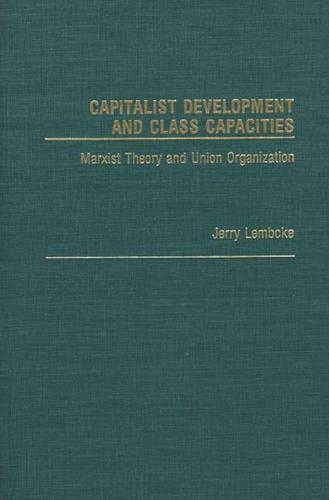
Capitalist Development and Class Capacities: Marxist Theory and Union Organization
(Hardback)
Publishing Details
Capitalist Development and Class Capacities: Marxist Theory and Union Organization
By (Author) Jerry Lembcke
Bloomsbury Publishing PLC
Praeger Publishers Inc
6th October 1988
United States
Classifications
Tertiary Education
Non Fiction
331.880973
Physical Properties
Hardback
213
Description
This thought-provoking study argues for a restoration of the classical Marxist position linking the development process, class formation, and class capacities; in practical terms it argues for a restoration of strategies premised on a dialectical understanding of capitalism that sees the process of proletarianization as a capacity-enhancing one rather than a capacity-eroding one. Lembcke adopts Therborn's position that the fundamental power resource available to the working class is its capacity for unity through mutually supported and concerted practices, and that this capacity is rooted in the organizational structure. His work synthesizes three major areas of thought on the subject, including the work in logics of collective action (Offe and Wiesenthal), studies of class formation (Gordon, Edwards, and Reich) and class capacities (Therborn), and organizational studies done within the strategic choices framework (Cornfield).
Reviews
." . . Capitalist Development and Class Capacities is a rich theoretical work that challenges conventional interpretations in the labor-studies field while offering readers a variety of creative methods for examining trends and prospects for labor militancy in the future. . . . [A] valuable addition to labor studies. . ."-Nature, Society, and Thought
. . . Capitalist Development and Class Capacities is a rich theoretical work that challenges conventional interpretations in the labor-studies field while offering readers a variety of creative methods for examining trends and prospects for labor militancy in the future. . . . [A] valuable addition to labor studies. . .-Nature, Society, and Thought
This book seems addressed to left-wing scholars interested in the history and development of labor unions and to union activists because Lembcke wants to establish an improved Marxist perspective on the relation between capitalist development and working-class empowerment in order to improve the workers' lot. An intriguing distinction is drawn between what is termed pecuniary logic' of union activists and associational logic': in the former case internal union relations are driven by financial considerations, and in the latter case they are driven by group or collegial considerations. One chapter explores those relations for three unions during the 1930s and '40s when they were affiliated with the CIO. The notion that members of the working class are affected differentially by capitalism plays a strong role in the author's arguments. . . . Upperdivision and graduate collections.-Choice
This is a theoretical and historical study of U.S. labor, especially in the twentieth century. The author successfully applies Marxism in three areas: 1) formation of the working class in stages of U.S. capitalism, 2) manifestations of "class capacities" for struggle, and 3) union organizational forms as enablers of class struggles. . . . His statement that much of the U.S. Left has marginalized the working class, highlights the importance of this work. Counter examples to such marginalization are the essence of Lembcke's admirable study. The record shows, for example, that the industrial concentration policy that the Communist Party in the United States has followed through its history, projects industrial workers in a central role.-Labor Studies Journal
"This is a theoretical and historical study of U.S. labor, especially in the twentieth century. The author successfully applies Marxism in three areas: 1) formation of the working class in stages of U.S. capitalism, 2) manifestations of "class capacities" for struggle, and 3) union organizational forms as enablers of class struggles. . . . His statement that much of the U.S. Left has marginalized the working class, highlights the importance of this work. Counter examples to such marginalization are the essence of Lembcke's admirable study. The record shows, for example, that the industrial concentration policy that the Communist Party in the United States has followed through its history, projects industrial workers in a central role."-Labor Studies Journal
"This book seems addressed to left-wing scholars interested in the history and development of labor unions and to union activists because Lembcke wants to establish an improved Marxist perspective on the relation between capitalist development and working-class empowerment in order to improve the workers' lot. An intriguing distinction is drawn between what is termed pecuniary logic' of union activists and associational logic': in the former case internal union relations are driven by financial considerations, and in the latter case they are driven by group or collegial considerations. One chapter explores those relations for three unions during the 1930s and '40s when they were affiliated with the CIO. The notion that members of the working class are affected differentially by capitalism plays a strong role in the author's arguments. . . . Upperdivision and graduate collections."-Choice
Author Bio
JERRY LEMBCKE is a member of the Department of Sociology at The College of Holy Cross, Worcester, Massachusetts.
